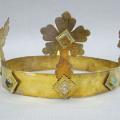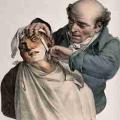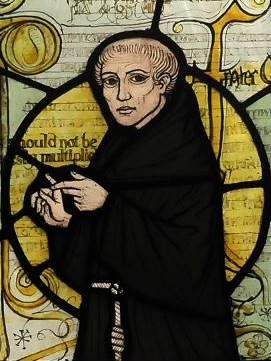271. Do As You’re Told: Ockham on Ethics and Political Philosophy
William of Ockham on freedom of action and freedom of thought.
Themes:
• P. Boehner (ed. and trans.) and S.F. Brown (rev.), Ockham: Philosophical Writings (Indianapolis: 1990).
• R. Wood, Ockham on the Virtues (West Lafayette: 1997).
• L. Freppert, The Basis of Morality According to William of Ockham (Chicago: 1988).
• M. McCord Adams, “The Structure of Ockham’s Moral Theory,” Franciscan Studies 46 (1986), 1-35.
• A.S. McGrade, The Political Thought of William of Ockham (Cambridge: 1974).
• T.M. Osborne, “Ockham as a Divine-Command Theorist,” Religious Studies 41 (2005), 2-11.
• S. Schierbaum, "The Double Intentionality of Moral Intentional Actions: Scotus and Ockham on Interior and Exterior Acts," Topoi (2021).
• P.V. Spade (ed.), The Cambridge Companion to Ockham (Cambridge: 1999).
• B. Tierney, “Ockham, the Conciliar Theory and the Canonists,” Journal of the History of Ideas 15 (1954), 40-70.







Comments
text of the latest podckasts
Hi peter. i am Mehdi and I send You this mail from iran. I am the student of western philosophy in M.A. degree. I try to learn english with your adorable file and I listen to this podcasts everyday again and again. I download the books of your audio books but for the latest ones i can not find related text in your site. Can you help me to have the texts? Thank you very much for your acclaim efforts
In reply to text of the latest podckasts by mehdi azmoodeh
text
These episodes will actually appear as a book next year, so if you can wait then you can read along when that comes out! In general I don't make the scripts available otherwise, since they are a bit of a mess still plus I don't want to undermine the books by having an unofficial transcript circulating as well.
Thanks for your interest in the series!
William of Ockham and William of Baskerville
You may recall that the hero of Umberto Eco's first novel "Il Nome della Rosa" (The Name the Rose) is an English Francisian Friar named William of Baskerville. Many people I know assert that this friar is a very thinly disguised William of Ockham. Unfortunately Eco died about this time last year, so we can't ask him directly, but I am wondering what you would think of this assertion.
In reply to William of Ockham and William of Baskerville by Bear
More Williams
Yes, I have heard that too - actually I think it is generally assumed that the character is at least named William in honor of Ockham, if not exactly based on him.
In reply to William of Ockham and William of Baskerville by Bear
William of Ockham and William of Baskerville
I have read Eco say that he had considered making William of Ockham his detective protagonist, but found him too objectionable a character (if I remember correctly) so invited a fictional character instead, a follower of Ockham. I don't recall now, but I probably read this in a little book he wrote called "Reflections on The Name of the Rose" about the writing of the novel.
It is interesting that the novel discusses many of the ideas of medieval politics included in these recent podcast episodes. The action centres around a debate about the poverty practiced by the Franciscan order and some of the people Peter talks about are mentioned in the novel, such as Ludwig of Bavaria and Pope John XXII (or "the wicked usurper, simoniac and heresiarch", as the novel's narrator calls him).
In reply to William of Ockham and William of Baskerville by Donald
Eco
Wow, I didn't remember all that - I read it more than ten years ago, I think. I must revisit it now after working through all this 14th century stuff!
More like Hackham
My gosh, the walking to church and jumping off a cliff examples are so obviously fallacious! In the first case, nobody would claim that merely walking to church is a virtuous act - it depends on the act that you are going to do when you get there. Worshipping God is inherently virtuous; burning down the church is not. In the second example, continuing to fall is not even an act. The real act - that of jumping off the cliff to kill oneself - does not cease to have been sinful because one later repents of it.
In reply to More like Hackham by Thomas Mirus
Ockham's example
I'm inclined to agree about the falling bit, but the first part may have been my explaining it too quickly: he specifies that one is at first going to church for the right reason viz to worship God, and then one changes one's intention along the way.
Suicide case
Dear Prof.Adamson,
Around 6:36 you start to explain Ockham's notion of the neutrality of the acts in themselves compared to the the moral aspect of the intention and reasons why one might undertake them. Then you mention the case of suicide. Is it Ockham's original example? If so, would you be able to provide a reference to the source, where said example is discussed by Ockham?
Thank you in advance for the reference!
Stanisław
In reply to Suicide case by Stanisław
Ockham
Yes, I can help with that, I found the example at P. Boehner (ed. and trans.) and S.F. Brown (rev.), Ockham: Philosophical Writings (Indianapolis: 1990), 144-7.
In reply to Ockham by Peter Adamson
Suicide
Thank you very much!
Add new comment